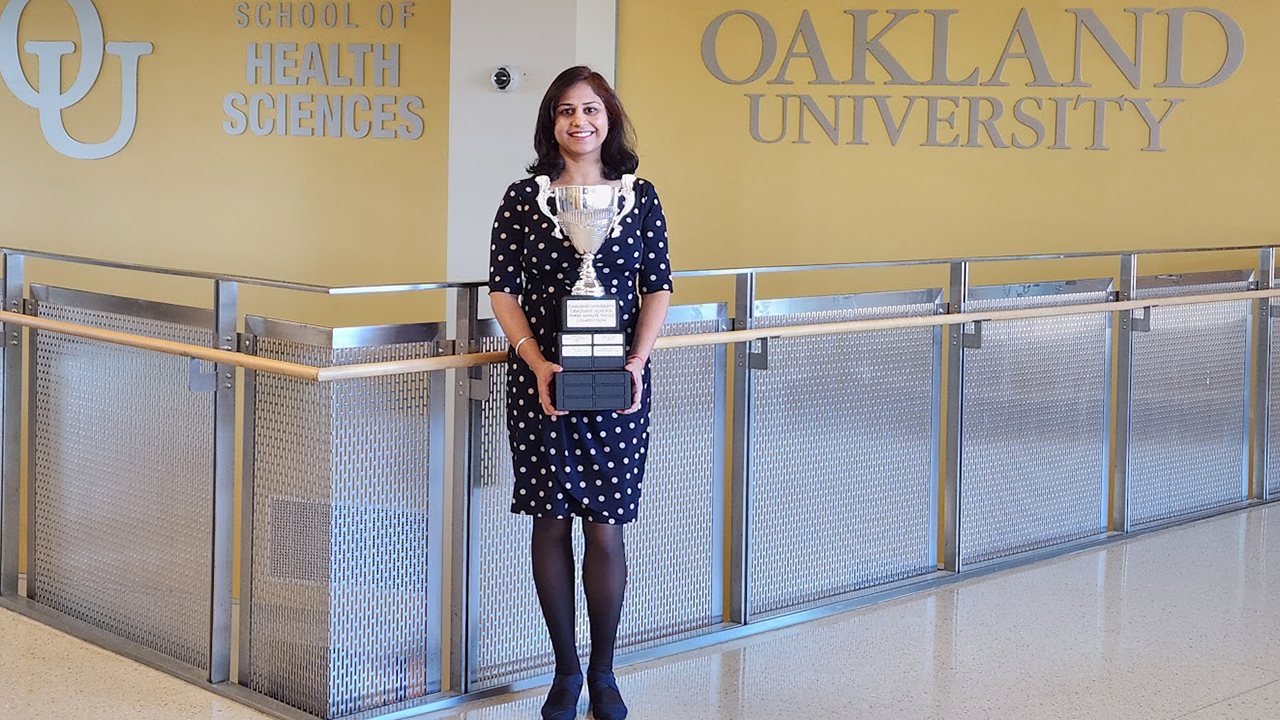OU graduate student competes in worldwide ‘Three Minute Thesis’ competition

After winning the Oakland University Three Minute Thesis (3MT) competition in both 2023 and 2024, Shweta Kapur — a physical therapist, Ph.D. candidate, and graduate research and teaching assistant in the Department of Human Movement Science at OU — was encouraged by her mentor, Dr. Daniel Goble, to participate in the Worldwide 3MT competition organized by the International Society of Gait and Posture (ISPGR).
Her research presentation, titled “Roadblocks to Managing Balance Problems,” successfully advanced through all of the qualifying rounds, and Kapur was selected as one of the top five finalists from the worldwide submissions to present live at the final 3MT competition, which took place over the summer and had participants from the United States, Canada, Belgium, the Netherlands, and Australia.
“Although I did not win the worldwide competition, it was an honor to be selected as one of the top finalists from the worldwide submissions, and my presentation was well-received,” Kapur said. “I also had an opportunity to hear about some ground-breaking research work on related topics being done throughout the globe.”
The Worldwide 3MT competition was held virtually this year and included three qualifying rounds. The first round involved the submission of a written research abstract written in a language appropriate for a general audience. In the next round, the qualifying graduate students were asked to send a recording of their presentation. Finally, the top five finalists were selected to present live during the annual general meeting of the ISPGR.
“I talked about two studies in this presentation,” Kapur said. “In the first research project, I investigated the barriers to healthcare utilization — or the use of healthcare services — for balance problems in the U.S. population. Upon analyzing the data from a national sample of 1,834 adults over the age of 40 with balance problems, we found four major barriers. Old age, not having visited a healthcare provider in the past year, lack of health insurance coverage, and not having experienced any falls yet were associated with reduced use of healthcare services. We also found that those with balance problems tend to wait until they start falling before they seek help.”
Her second study looked at the national data of over 4,900 individuals and compared what these individuals said about having a balance problem to their performance on clinical tests to check for balance. Kapur found that close to seven out of every 10 individuals with clinically detectable balance issues were unaware of their balance problems.
“This topic is important because falls are a major healthcare burden,” she said. “They are one of the leading causes of mortality and morbidity in adults.”
Kapur said participating in the competition was “an incredible and humbling experience.”
“Advancing to the finals alongside talented researchers from across the globe filled me with pride and reinforced my passion for sharing my work on managing balance problems with a wider audience,” she added. “I am grateful for the support from the wonderful faculty and leadership at the Oakland University School of Health Sciences that supported this research work and helped facilitate my registration for this global event.
“I am also grateful to the Oakland University Graduate School for organizing the 3MT competition annually and providing graduate students with an amazing opportunity to learn this much needed skill of presenting our complex research work to a general audience in a short time, a skill that is vital for success today.”
In addition to the 3MT, Kapur has also presented some of the results of her research at various national and regional scientific conferences, including the Annual Meeting of the American Geriatric Society, the International Regenerative Rehabilitation Symposium at Harvard University, and the American Physical Therapy Association – Michigan conference.

 October 04, 2024
October 04, 2024







